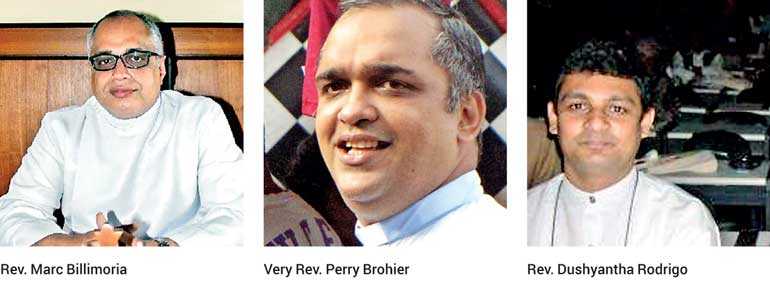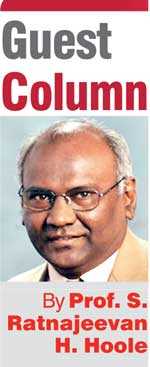Thursday Feb 19, 2026
Thursday Feb 19, 2026
Saturday, 22 August 2020 00:01 - - {{hitsCtrl.values.hits}}

 Our church has two dioceses: Colombo and Kurunegala. Each is headed by a Bishop and both are under the Archbishop of Canterbury. Our Bishop of Colombo – by far the most powerful with almost everything under him except Kurunegala and Kandy – the Rt. Rev. Dhiloraj Canagasabey had turned 65 recently and we had to call for a new election. Our Bishops get a 10-year term unless thy reach their 65 years sooner.
Our church has two dioceses: Colombo and Kurunegala. Each is headed by a Bishop and both are under the Archbishop of Canterbury. Our Bishop of Colombo – by far the most powerful with almost everything under him except Kurunegala and Kandy – the Rt. Rev. Dhiloraj Canagasabey had turned 65 recently and we had to call for a new election. Our Bishops get a 10-year term unless thy reach their 65 years sooner.
Thus it was that the clergy and lay representatives from the numerous parishes gathered on Saturday 15 August at the precincts of the cathedral on Bauddhaloka Mawatha, formerly Bullers Road.
The rules governing election are rather archaic. They had been set to give control to our Archbishop, His Grace The Archbishop of Canterbury. They make it difficult for anyone to win and almost invariably necessitate reference to the Archbishop of Canterbury who will decide unless we select a person with a very high vote.
We have the House of clergy and the House of Laity. Each has to give the winner two-thirds of the vote. Failing that, everyone getting less than 20% is eliminated and there is a new round of voting between the remaining. A 60% win is required in each House now.
When a reference is made to Canterbury, he seeks counsel usually from the person he knows well, the outgoing Bishop, because he does not know the local politics. This violation of democracy has a long history. I know that even the much-talked-of Bishop Lakdasa de Mel of Kurunegala, who lost the vote to the Archdeacon of Kandy I believe, was selected by this dubious process.
The archaic rules also pretend to ignore reality. Until 15 August no one was to declare his candidature. As claimed, the Holy Ghost will inspire a person to nominate a candidate from the floor, and the nominee, also energised by the Holy Ghost, would accept the nomination. Despite the pretence, we all knew as far back as late last year that the candidates would be The Rev. Dushyantha Rodrigo (Headmaster of St. Thomas’ Prep), The Very Rev. Perry Brohier (Archdeacon of Colombo) and The Rev. Marc Billimoria (Warden of St. Thomas’ Mount).
The latter name floated up and down as interested, not interested etc., but by recent times it was evident that he would agree (regardless of the Holy Ghost). Campaigning has been in earnest. It was widely let known that Bishop Dhilo wanted Brohier because both are said to be so-called Bible-believing evangelicals although the other two, too, are Bible-believing.
Although Brohier was a candidate and known to be so, he was allowed to call the Council to order, giving him good exposure. Those who protested were told the Holy Spirit argument. When the protest was widely the talk of the church, Brohier backed off, presumably having been moved ahead of 15 August by the Holy Spirit to know he is a candidate. The rules require the senior-most archdeacon to chair. He agreed he would not.
The four Archdeacons are Bishop Dhilo’s appointees so all have a healthy and obedient respect for him. With Brohier now admittedly contesting, it should have been the next senior-most. But Sam Ponniah, whom the Bishop appointed Archdeacon for Jaffna by jumping over several senior priests, was declared by the Registrar to be the chair, again jumping to the front. Unlike the other Archdeacons he is aggressive enough to tweak the system.
The Registrar, Chanaka de Silva, is also known to be of loyal service, declaring as not permitted all resolutions that do not please the Bishop, because they “are beyond the competence” of the Council or “detrimental to the fellowship and unity of the body of Christ”. By his definition he can over-rule any resolution that the Bishop does not like. With his legal counsel, Bishop Dhilo even managed to ignore a near unanimous resolution asking for corrections to the Tamil Eucharistic liturgy that are being translated by Rev. Joshua Rutnam calling God “without holiness” and eliminating all references to God as Almighty, “Thou only art Holy,” etc. because it is an insult to other gods. He left out one of the 10 commandments, still calling it the Decalogue.
The manipulation did not end there. A cheap trick by Rutnam while proposing Billimoria was to say that Billimoria had earned his degree from Oxford London (or London Oxford, I am not sure). The University of London is distinct from the University of Oxford. It upset many. In fact Fr. Billimoria earned his theology degree from what the college itself describes thus: “Ripon College Cuddesdon is a Church of England theological college.” It is neither in Oxford nor in London.
The STC Centenary Group misspells the name as “Ripon College Cuddecdon,” rather surprising for an elitist group that tells others that they do not know English when they write St. Thomas’ instead of S. Thomas’ (the alternative and rare form they use for distinction). The elitism is so ingrained that the school switched from soccer to rugger, openly stating in writing that soccer is for ordinary people, but rugger is for those who are employed by the private sector.
There has been some suspicion over vote counting after Hiran Fernando reported that a then young vote counter, later the Secretary calling himself CEO of the Church, sought his counsel asking, “Uncle some people asked me to change the number. What do I do?”
So some did not want a package where the Standing Committee headed by the Bishop proposed names for recording and counting. When Engineer Selliah Premkumar proposed supplementing that list, Ponniah asserted that adding names is to not trust the appointees. Put in those terms, the House rejected Premkumar’s suggestion. When points of order were raised, Ponniah simply failed to rule and moved on.
The first round results were as seen in Table 1.
Not having secured 20% of the clergy vote Billimoria was eliminated for the next round. (If not the dreadful and likely consequence is that we would have had to vote on the same three candidates, leading perhaps to a deadlock unless somebody withdrew or a new candidate entered the fray.)
By the time we got to the second round it was close to midnight we had started with morning prayer and mass at 7 a.m. We were tired. The results were as seen in Table 2.
It was as I had predicted to friends – even if all of Billimoria’s clergy switched to Rodrigo, he would not get 60% of the clergy. No surprise in a Church where many priests are out of touch with the laity.
To understand the vote and the difference between clergy and lay vote results, one must understand the clerical mentality with respect to the Bishop. My mother told me of the time when union among the Protestant Churches was being hotly discussed. Our English Bishop was opposed to it and the overwhelming vote was against union. Shortly after the Bishop left, the new Bishop was all for union. The Diocese immediately responded with an overwhelming vote for union.
This obsequiousness must be seen in the light of the clergy being so dependent on their Bishop, even an outgoing Bishop, to whom they might be obligated for much – postings, children’s school admission, scholarships, leave, etc. Just look at the priests who manage to stay permanently in Colombo with rich congregations – children at St. Thomas’, Ladies or Bishop’s. In contrast my priest in Jaffna has an old motorbike and I have seen him taking his full-term wife for a check-up on his pillion like the once Head of the Methodist Church, Engineer Rev. Duleep Fernando transported his expecting wife, a Professor.
The election failed because Rodrigo did not get 60% of the clergy, although he got 63.28% of the overall vote. A gracious Brohier should have withdrawn so that as the lone candidate Rodrigo would get 100% of the vote. He did not. Can Brohier in conscience, if that happens, now accept an appointment as Bishop with merely 36.72% of the overall vote? And from Archbishop Justin Welby who is defending himself against charges of covering up clerical sexual abuse in the UK that could potentially lead to his resignation.
We must change our anachronistic constitution and make it democratic without handing over undeserved power to our Bishops to reward favourites and ideological bedfellows. We must let the real people of the church choose.
